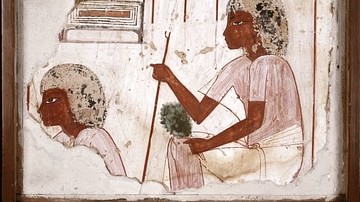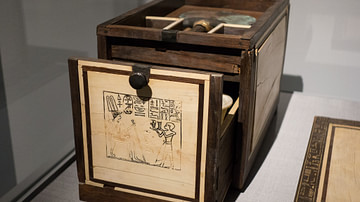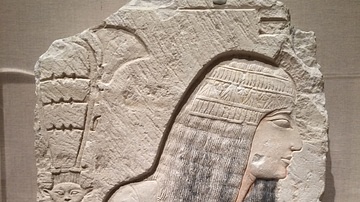Search
Search Results

Definition
Middle Kingdom of Egypt
The Middle Kingdom (2040-1782 BCE) is considered ancient Egypt's Classical Age during which it produced some of its greatest works of art and literature. Scholars remain divided on which dynasties constitute the Middle Kingdom as some argue...

Article
Immortality of Writers in Ancient Egypt
For the ancient Egyptians, life on earth was only one part of an eternal journey which continued after death. One's purpose in life was to live in balance with one's self, family, community, and the gods. Any occupation in Egypt was considered...

Article
Egyptian Gods - The Complete List
The gods and goddesses of Ancient Egypt were an integral part of the people's everyday lives for over 3,000 years. There were over 2,000 deities in the Egyptian pantheon, many whose names are well known - Isis, Osiris, Horus, Amun, Ra, Hathor...

Article
Cosmetics, Perfume, & Hygiene in Ancient Egypt
For the ancient Egyptians life was a celebration, and so, just as one would want to look one's best at any party, personal hygiene was an important cultural value. The Egyptians bathed daily, shaved their heads to prevent lice or other problems...

Article
Beer in Ancient Egypt
Considering the value the ancient Egyptians placed on enjoying life, it is no surprise that they are known as the first civilization to perfect the art of brewing beer. The Egyptians were so well known as brewers, in fact, that their fame...

Article
Color in Ancient Egypt
The ancient Egyptians had a great appreciation for life which is clearly depicted through their art. Images of people enjoying themselves - whether in this life or the next - are as plentiful as those most often seen of the gods or funerary...

Article
Women's Work in Ancient Egypt
Women in ancient Egypt had greater rights than in any other civilization of the time. They could own land, initiate divorce, own and operate their own business, become scribes, priests, seers, dentists, and doctors. Although men were dominant...

Article
Death in Ancient Egypt
To the ancient Egyptians, death was not the end of life but only the beginning of the next phase in an individual's eternal journey. There was no word in ancient Egyptian which corresponds to the concept of "death" as usually defined, as...

Article
Mummification in Ancient Egypt
The practice of mummifying the dead began in ancient Egypt c. 3500 BCE. The English word mummy comes from the Latin mumia which is derived from the Persian mum meaning 'wax' and refers to an embalmed corpse which was wax-like. The idea of...

Article
Music & Dance in Ancient Egypt
Music and dance were highly valued in ancient Egyptian culture, but they were more important than is generally thought: they were integral to creation and communion with the gods and, further, were the human response to the gift of life and...